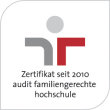Topics Page: Social Background
The University is committed to its guiding principle of diversity amongst its members. This includes identifying discriminatory structures, language and actions, gathering knowledge in way that is sensible of discrimination and creating an environment that offers equal opportunities for everyone.
This topics page is a collection of information, support and networking opportunities concerning the issues of social background for University students.

Overview:
Glossary – What are we talking about?
Events and offers – What is happening at the University?
Book and audio recommendations – Where can I learn more?
Empowerment and networking – Where can I connect with others?
Glossary
Working-class child
Working-class children is an umbrella term for students who are the first in their families to go to university. In this context, the term is oftentimes associated with lower social status, lesser educational opportunities and lesser financial possibilities. A term that evolved over time, “working-class child” is not uncontroversial. It is therefore often replaced with terms such as first-generation students or students from non-academic families/homes.
Educational success
Educational success refers to earning certain formal educational degrees in the school and vocational educational system. In educational hierarchy, the completion of a doctoral degree at a university is seen as the highest level of education. Educational success is influenced by different factors, but oftentimes it is family circumstances (such as background, socioeconomic status, the parents’ educational background), school parameters (such as school structures among other things) and/or political conditions (such as the social and educational system of the state) that are mentioned in this context.[1]
Educational disadvantage
In connection with non-academic homes, you may sometimes still here them being described as “bildungsfern” or “bildungsarm.” Such descriptions should be avoided. They are problematic because they imply that an academic education is the only form of education that matters. In addition, these terms have negative connotations and suggest that the families are somehow at fault or that such circumstances are simply a natural given, when, in fact, there are structural inequalities in society that impede prospects of participation and educational progress (see classism).
Habitus
In discourse on social background, you will oftentimes find mention of “habitus.” Sociologist Pierre Bourdieu[2] uses the term to describe certain schemes of perception, thought and action in connection with an individual’s socialisation. In this context, he also talks about different forms of capital (economic, cultural and social) that shape one’s own position and opportunities in society. If a person is familiar with a particular habitus following socialisation via family and environment, they can navigate more easily those social spaces in which this particular habitus is important. At the same time, a particular habitus can become a mechanism of exclusion for those who are not familiar with the rhetoric, behaviour and codes of a group. This results in disparate chances at fulfilment and participation in social and professional life. The university, too, is a social space shaped by academic habitus. First-generation students are oftentimes unfamiliar with this academic habitus, which may affect their well-being and success in studying.
Classism
Classism denotes the discrimination of persons based on their social background or position. As with other forms of discrimination, classism works both on an individual level (abusive comments, humiliation etc.) and on a structural level (limited access to housing, educational degrees, health care). In the late 1970s, a group of Black, lesbian feminists were the first to address social background as an essential characteristic in multiple discrimination (“gender, race, class”).[3] In Germany, “social background” is not (yet) listed as one of the protected characteristics in the General Act on Equal Treatment (AGG). However, according to the Federal Anti-Discrimination Agency’s third report on discrimination in Germany, “social background” is a powerful cross-sectional category.[4]
Non-traditional students
This term describes students who earned their university entrance qualification via what is called the zweite Bildungsweg or dritte Bildungsweg. Zweiter Bildungsweg here refers to a non-traditional pathway towards school diplomas, which are completed at a later stage in life by, for instance, attending night classes. Dritter Bildungsweg denotes the taking up of studies at a university without (Fach-)Abitur after having completed vocational training and having gained practical experience.
Social background
As a diversity characteristic, social background denotes the sociocultural as well as economic heritage that every person carries with them by birth and socialisation. Analysed from the perspective of discrimination, social background is informed by an unequal distribution of resources.
In the context of higher education, social background particularly impacts factors such as access to higher education, success in studying, study progress and study financing.[6] Social background becomes a characteristic of discrimination when people are being exposed to prejudices, treated disrespectfully, discriminated against or excluded based on their social background and position.
[1] Gerhartz-Reiter, S. (2017): Einflussfaktoren auf den Verlauf von Bildungskarrieren. In: Erklärungsmuster für Bildungsaufstieg und Bildungsausstieg. Springer VS, Wiesbaden. pp. 61-138ff.
[2] Bourdieu, P. (1993): Sozialer Sinn (Strukturen, Habitusformen, Praktiken). Frankfurt Suhrkamp. pp. 101ff.
Bourdieu, P. (1982): Der Sozialraum und seine Transformationen. In: Die feinen Unterschiede– Kritik der gesellschaftlichen Urteilskraft. Frankfurt am Main. pp. 171–210.
[3] Combahee River Collective (1977): A Black Feminist Statement. In: Zillah Eisenstein (ed.): Capitalist Patriarchy and the Case For Social Feminism.
[4] Diskriminierung in Deutschland - Dritter Gemeinsamer Bericht der Antidiskriminierungsstelle des Bundes und der in ihrem Zuständigkeitsbereich betroffenen Beauftragten der Bundesregierung und des Deutschen Bundestages, 2020. (Last accessed 20.05.21)
[5] Hradil, S. (2004): Die Sozialstruktur Deutschlands im internationalen Vergleich (1st ed.). Wiesbaden: VS, Verl. für Sozialwiss. pp. 134ff.
[6] Hochschulbildungsreport 2020
Events and offers – What is happening at the University?
Winter term 2022/23
New Potential Program for students from non-academic families to promote the academic sucess of first-time students in order to provoke their academic sucess and diversity in the academic einvironment.
New Potentials - Förderprogramm für Erststudierende
Book and audio recommendations
Books:
- Julia Reuter / Markus Gamper / Christina Möller / Frerk Blome (Hg.): Vom Arbeiterkind zur Professur. Sozialer Aufstieg in der Wissenschaft. Autobiographische Notizen und soziobiographische Analysen
- Francis Seeck, Brigitte Theissl (2021): Solidarisch gegen Klassismus – organisieren, intervenieren, umverteilen organisieren, intervenieren, umverteilen
- Riccardo Altieri, Bernd Hüttner (Hg): Klassismus und Wissenschaft. Erfahrungsberichte und Bewältigungsstrategien
- Aladin El-Mafaalani: Mythos Bildung: Die ungerechte Gesellschaft, ihr Bildungssystem und seine Zukunft
- Andreas Kemper: Klassismus. Eine Bestandsaufnahme. Herausgegeben vom Landesbüro Thüringen der Friedrich-Ebert-Stiftung, 2016. Online
 accessible
accessible
- Combahee River Collective. 1977: A Black Feminist Statement. In: Zillah Eisenstein (Hrsg.): Capitalist Patriarchy and the Case For Social Feminism.
- Anja Meulenbelt: Scheidelinien. Über Sexismus, Rassismus und Klassismus. Rowohlt Verlag, Reinbek 1988
Empowerment and networking, locally and across Germany
![]() Arbeiterkind.de e.V.: Networking, orientation and mentoring for first-time students
Arbeiterkind.de e.V.: Networking, orientation and mentoring for first-time students
![]() Regionalgruppe Heidelberg
Regionalgruppe Heidelberg
heidelberg@arbeiterkind.de
![]() Netzwerk Chancen: Supporting social advances of students
Netzwerk Chancen: Supporting social advances of students
![]() Erste Generation Promotion e.V.: Mentoring and networking for doctorate students
Erste Generation Promotion e.V.: Mentoring and networking for doctorate students
![]() Ada Netzwerk e.V.: Networking and mentoring in support of (future) Afro-German (first-time) academics
Ada Netzwerk e.V.: Networking and mentoring in support of (future) Afro-German (first-time) academics
![]() Speed up, Buddy! e.V.: Mentoring and networking for first-time academics up to their career entry
Speed up, Buddy! e.V.: Mentoring and networking for first-time academics up to their career entry
Scholarships and finances:
![]() Support programme Studienkompass of the German Economy Foundation
Support programme Studienkompass of the German Economy Foundation
![]() Lux Like Stipendium of the Rosa-Luxemburg-foundation: Special scholarship for first-time future academics
Lux Like Stipendium of the Rosa-Luxemburg-foundation: Special scholarship for first-time future academics
![]() ApplicAid e.V.: Study guide, information, workshops and mentoring on scholarship applications for future first-time academics
ApplicAid e.V.: Study guide, information, workshops and mentoring on scholarship applications for future first-time academics






